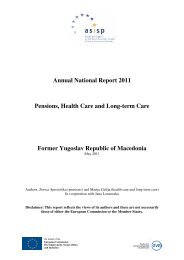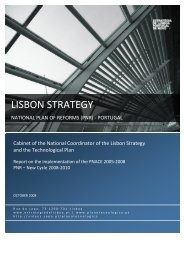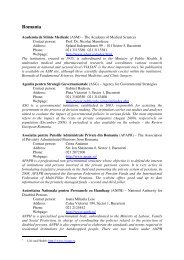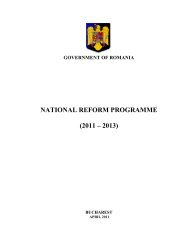National reform programme 2008-2010 Malta - European Commission
National reform programme 2008-2010 Malta - European Commission
National reform programme 2008-2010 Malta - European Commission
You also want an ePaper? Increase the reach of your titles
YUMPU automatically turns print PDFs into web optimized ePapers that Google loves.
In this respect, energy efficiency can have a significant impact on the demand for energy and<br />
so, it can reduce the country’s fuel bill and the release of carbon into the environment. Within<br />
this context, <strong>Malta</strong> will embark on a set of initiatives that will contribute towards a 10%<br />
reduction in CO 2 emissions by 2020. In fact, Government has already set up a committee of<br />
national experts with a view to assess the possibility of tapping into sources of alternative<br />
energy as well as to address <strong>Malta</strong>'s national obligations in relation to carbon dioxide<br />
emissions.<br />
The Maltese Government needs to increase reliance on RES with the aim to diversify the fuel<br />
mix, reduce air pollution, reduce local dependence on polluting and costly fuel sources and<br />
ease economic burdens on domestic households and commercial enterprises. Within this<br />
context, Government will heavily invest in renewable energy sources through the assistance<br />
of structural funds. It is envisaged that a number of financial subsidies will be distributed<br />
locally to target the domestic and commercial sector in conjunction with a national information<br />
campaign.<br />
Following the widespread success achieved with the rebate schemes on energy saving<br />
domestic appliances, the Government intends to extend such scheme to RES equipment by<br />
increasing financial subsidies for solar water heaters, photovoltaic and micro-wind generators.<br />
In 2006 market response to solar thermal installations in <strong>Malta</strong> saw a significant improvement,<br />
as requests for financial subsidies increased to 1,564 when compared to the 360 subsidies<br />
awarded in 2005. Through these aid schemes <strong>Malta</strong> intends to double such figure to 3,000<br />
units solar water heaters sold per household in 2009, (in addition to the 220 photovoltaic units<br />
and micro-wind generators to be sold ) thus providing a substantial contribution towards the<br />
targets of 2020.<br />
It is estimated that a total amount of 3,145 Mwh/annum (3,000 Mwh/annum domestic + 145<br />
Mwh/annum Commercial) in energy will be saved each year. This means that a total of<br />
903,500 Kg of CO 2 (865,800 Kg Domestic + 37,700 Kg Commercial) will not be released into<br />
the atmosphere.<br />
The Maltese Government is also planning to embark on a wide educational campaign, partly<br />
co-financed by the 2007-2013 EU structural funding, that will educate the general public on<br />
the needs of being ‘energy saving’ conscious and on the need of adopting energy friendly<br />
measures as well RES equipment. The Government will disseminate such good practices<br />
through seminars, conferences, newspapers, TV and radio spots, websites and schools.<br />
Climate Change<br />
Climate change is a cross-cutting global issue which is affecting the foundations of socioeconomic<br />
life globally. <strong>Malta</strong>, being a small island state, is highly susceptible to the negative<br />
impacts of climate change. These impacts include rise in sea levels, increase in draught,<br />
higher temperatures, etc. These impacts have an effect on key economic sectors including<br />
tourism, manufacturing and agriculture.<br />
In <strong>2008</strong>, <strong>Malta</strong> has managed to successfully complete its Greenhouse Gas (GHG) Inventory<br />
for the period 1990-2006 and submit the <strong>National</strong> Inventory Report for <strong>2008</strong>. The national<br />
GHG inventory is also streamlined with the national emissions inventory. It is envisaged that<br />
data from the GHG inventory will assist in the development of national policies towards<br />
emission reduction.<br />
In addition, Government appointed the Climate Change Group of Experts in June <strong>2008</strong>. The<br />
Group of Experts is working on an action plan to reduce GHG emissions, over a 20 week<br />
period, with the scope of addressing <strong>Malta</strong>’s commitments within the negotiation process of<br />
the Climate Change and Energy Package. Furthermore, a <strong>National</strong> Strategy for Climate<br />
Change will be adopted with a view to better address the challenges posed by climate change.<br />
<strong>Malta</strong> <strong>National</strong> Reform Programme <strong>2008</strong>-<strong>2010</strong> - 66 -







